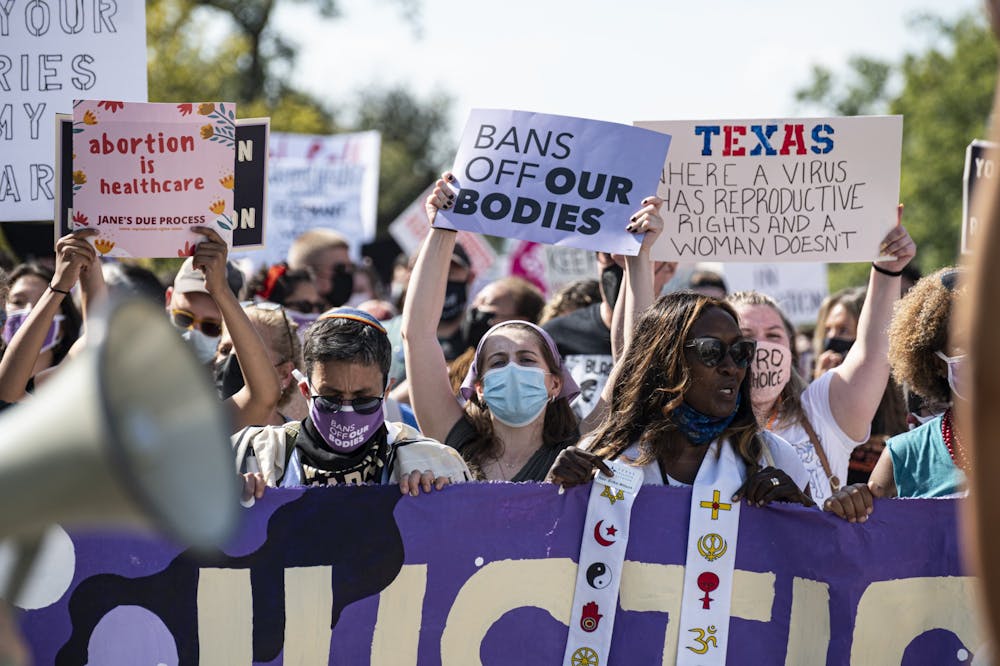The debate over abortion rights has become inseparable from this year’s midterm election campaigns, with 50% U.S. voters reporting they are more motivated to vote this fall because the U.S. Supreme Court’s decision to overturn Roe v. Wade, according to recent polling from the Kaiser Family Foundation.
Now that the power to regulate abortion access has returned to state legislatures, races in swing states such as North Carolina could have significant effects on reproductive rights across the country.
Democratic candidate for North Carolina Senate Sean Ewing said abortion is a major issue in the election across the ballot. Ewing, who currently serves on Mebane’s City Council, said he is worried that if Democrats do not gain control of the North Carolina House or Senate, the right to an abortion — which is currently restricted after 20 weeks — could be further restricted.
But the abortion debate is not limited to local races and has been central to the platforms of both Ted Budd and Cheri Beasley, North Carolina’s Republican and Democrat Senate candidates respectively. Budd is currently serving District 13 — which covers Alamance County — in the U.S. House of Representatives. Beasley has most recently served as chief justice of the North Carolina Supreme Court.
On Sept. 13, Budd cosponsored national bill H.R.8814, the Protecting Pain-Capable Unborn Children from Late-Term Abortions Act, which would make abortion illegal after 15 weeks, except in cases of rape or incest. However, in order for these exceptions to be viable, the rape needs to be reported 48 hours before the abortion, and the person must either be a minor or have gotten counseling, medical treatment or received an injury as a result of the rape.
Ewing said in the district he currently serves in Mebane, most people he has interacted would not agree with having a 15 week abortion ban.
“They’re very pro-abortion rights,” Ewing said. “They’re very pro-women’s health. And we’re getting more and more people moving in every day that are appalled by what’s happening.”
State House of Representative member Amy Galey said her stance on abortion is more nuanced. Galey, candidate for the North Carolina Senate, said she does not campaign for a specific week limit through which an abortion ban is appropriate.
“I think that it’s really unfortunate that we’ve fallen into camps that are labeled pro-life and pro-choice,” Galey said. “My understanding is that people can choose either of those labels for themselves when they essentially agree on the same thing.”
Galey said while she isn’t informed enough on H.R.8814 to have a stance on the bill itself, she wants to hear from her constituents and see what people’s opinions are before fully forming an opinion. She has yet to come up with a full stance on what her role as a legislator should be regarding abortion after Roe v. Wade was overturned by the United States Supreme Court over the summer, especially regarding a timeline of how many weeks abortion should be protected for.
“I think it is extremely important to consider the developments that have been achieved and our understanding of fetal development, since Roe v. Wade was decided in the early 1970s. You wouldn’t want your cancer treated the same way, with the same medicine, the same approach in 1972,” Galey said. “We should … apply those to our understanding of when does life begin.”
Ewing said he is against any idea of an abortion ban, and while the idea of a ban is not something that would come up in his current role as a councilman, abortion rights have the possibility to come up in other forms if people voiced their opinions regarding Planned Parenthood clinics in the area.
“If a clinic were to come here, I’m sure people would definitely want to voice their opinion about that,” Ewing said. “So we just need to make sure that we’re doing everything we can to hold on to the rights that we have right now.”
Galey said her own opinions changed on abortion after becoming a mother. She said when she was in law school, one of her professors said that every law was made to either protect life or property, which she said changed her view on abortion as well.
“When I became a mother and my first child was crying inside my womb, I thought about that some more,” Galey said. “And I thought, you know what, there is a point in the growth of this baby inside of me that she cries, that she became a life, that deserved the protection of the law.”


